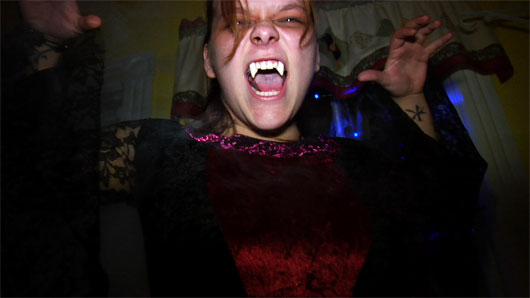By CHRYSA PIKRAMENOS
 Last week, I decided to see October Country, a documentary film which was playing at the IFC in New York City. The film, set in the economically depressed upstate New York area of Mohawk Valley, follows the emotionally dysfunctional Mosher family from one Halloween to the next.
Last week, I decided to see October Country, a documentary film which was playing at the IFC in New York City. The film, set in the economically depressed upstate New York area of Mohawk Valley, follows the emotionally dysfunctional Mosher family from one Halloween to the next.
Eighty minutes and $12 later, I kind of wished I made another movie choice, mainly because I went in with the expectation of witnessing an open sore of reality, but instead came out thinking most of the characters and events were hidden underneath a layer of artistic bandages.
October Country reminded me of a dressed up reality show. The editing and cinematic shots softened potentially repellent characters, typically found on unruly talk shows, for the purpose of invoking compassion and empathy.
Responsible for creating this mood are two directors, Donal Mosher and Michael Palmieri. Mosher has prior experience as a photographer and is also related to the Mosher family. Palmieri has experience in directing stop-motion art films, shorts, and music videos of artists such as Beck and Foo Fighters.
Kevin Lee, a reporter from The Auteurs, addresses the cinematic approach of the documentary’s deliverance, in an interview with the two filmmakers, entitled, “Aesthetic Voodoo: An Interview with the Filmmakers of Voodoo Country”. Lee states, “And maybe that speaks to why some critics take issue even with your film, because they consider overt stylization to be antithetical to any true depiction of reality.”
I must agree with the “some critics” that Lee mentions. There were many times I questioned if I was viewing a documentary or an art film. It seemed that the directors felt they needed to add their own external elements to accentuate their production in order to more befittingly fit their artistic vision.
After the movie was over I couldn’t stop thinking about one particular scene in which the grandfather, Don Mosher, who is also a post-traumatically stressed war veteran, talks about his experience as a young soldier returning home. Emotionally scarred from witnessing so many die, he becomes closed off from his family, internalizing his dark feelings and thoughts.
As he is verbally reliving this to the camera, old black and white war footage of soldiers fighting is playing in the background. This detail lent an obvious sense of orchestration to the film. I found it to be too perfectly timed, and too much of a coincidence that this man happened to be watching a war story while being interviewed about his personal war experience.
Palmieri said, “It depends on how you as a viewer are approaching a piece of work.” “If you’re going there and you’re looking for a “document,” you’re not prepared for the experience of what we’re doing, which is what we call creative non-fiction. You’re adhering to the facts of the matter, but you’re also commenting in as lyrical a fashion as you can, how the voice of the filmmakers comes into the project.”
Although I don’t question the integrity of the film as a whole, I do question possible restraints of specific parts of the film. I wonder if certain actions and emotions of the family members might have been cut by the directors. Perhaps those moments might have changed their vision or the mood of the film they desired, or possibly interfered with how the directors preferred to portray the family.
“And we are interested in countering those stereotypes with as real as possible, or as lyrically real, images of people that are typically portrayed as hysterical morons on television,” said Palmieri.
While their method may be successful in countering those stereotypes, it can be argued that it is not the most authentic way of filming a documentary. It seems that Palmieri’s definition of “lyrically real”, insinuates to some degree, that by using their artistic and poetic interpretation they are representing this family the way that they would like to, as opposed to how they may be in their most natural state.
Also, they touched upon some interesting subjects, but only skimmed the surface of each one. By focusing on the more superficial presentation of the issues at hand, rather than digging deeper into them, or at least one of them, undermines the overall seriousness of the film. I actually felt the tone of the movie leaned more on the lighthearted and humorous side, which didn’t quite coincide with the content.
With issues at hand such as domestic and sexual abuse, I got the feeling that either the family wasn’t being completely real with how they felt, or the filmmakers didn’t do a good job in being more aggressive and asking the right questions. Perhaps even the family and/or filmmakers opted to not expose that emotional side, because of either artistic limitations that they set for themselves, or theymight have just wanted to avoid further exploitation.
If I am about to see what is referred to as a “documentary”, I want to experience something that penetrates beneath the surface of someone’s existence. I want to find a deeper understanding of something that I can’t relate to, and why their circumstances are the way they are. Otherwise, I might as well just look at some photographs, and let my imagination take me on what would probably be a better film.
The duo did create nice still shots and were successful in creating moments of aesthetic refinement, but both seemed to be more concerned with the imagery rather than the pulp of the movie. As a documentary on all levels, the film is not one that provides viewers with a deeply provoking experience; it does, however, incite productive discussion.
*On a side note, I found it unusual that almost all of the Mosher family’s first names begin with the letter D, although it wasn’t something that was brought up in the movie. Well, there is Don the grandfather, Dottie the grandmother, Debbie the aunt, Donna the daughter, Donal the grandson who is the director and not shown in the movie, Daneal the granddaughter, and Desi the granddaughter. What’s up with that? The only ones whose names don’t begin with a D are Ruby, which is Daneal’s baby, and Chris, which is the foster kid who was already named prior to entering the family.
Trailer for October Country:




